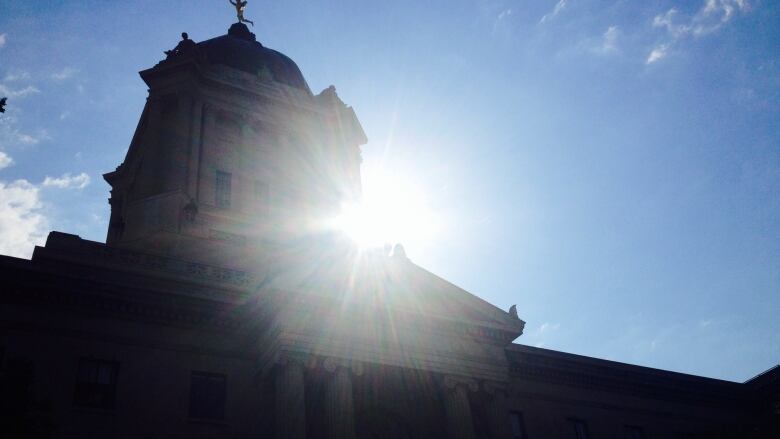Manitoba politicians could learn civility from teen debaters, judge says
Sportsmanship of high school students brought optimism for future of elected officials and public discourse

I had the pleasure of serving as a judge at a high school debate tournament this past weekend, with students from around Manitoba competing in British parliamentary style, positioning two pairs of students as the government against four on the opposition side.
The quality of the debate, energy for the topic and passion for logic, argumentation and public speaking shone through the students, as they debated a wide variety of topical issues ranging from the American election and the morality and legality of supervised injection sites to whether Canada should pursue free trade and extradition pacts with China.
- NDP MLAs accused of intimidating women in legislature
- MLA yelled 'Take your pants off' in legislature, PCs say, but NDP denies accusation
The ability of the participants alongside their commitment to civility and sportsmanship made me optimistic for the future of our elected officials and public discourse, should they happen to follow that path.
I want to take a moment to compare what I saw during this exhibition to the events of the past few weeks at our provincial legislature here in Manitoba.
During the most recent session of the legislature, we saw an episode where NDP MLAs James Allum and Andrew Swan heckled female legislators while debating a bill regarding sexual assault on campus, which was followed by government accusations of further unparliamentary behaviour.
Losing the spirit of debate
Ultimately, both these stories made the headlines, meaning debate over the bill and this important topic was underreported.
I am not here to reopen that debate and would rather point to the bigger picture in all of this. It could be argued that the quality, the spirit of the debate is lost when our elected representatives resort to heckling and shaming to make a point.
I wish I could say that I was shocked by this latest twist, but the upsetting reality is that behaviour of this nature is somewhat frequent, having been perpetuated by all parties at different times in the legislature. Are Manitobans really to be impressed by what happens in their legislature?
The debates I took in at a high school event were, quite simply, inspiring, reigniting my love for politics and well-crafted debate. Having been handed the topics a mere 20 minutes before the debate, the teams quickly crafted arguments, threw in the odd fact and respectfully countered their opponents' ideas.
The biggest difference between them and the provincial legislature? The fact that the students performed all of these tasks while actively answering questions and without insulting or demeaning their opponents.
Non-answers, heckling and jeering
When judging British parliamentary debate, we are meant to score the participants' efforts out of a possible 100. We are also instructed to take note of personal attacks; debaters are discouraged from personally attacking their opponents. Such attacks, at a judge's discretion, can result in an automatic loss for the team that commits the offence.
In a competitive debate, the best debaters are the ones who can promote their own ideas while effectively exposing the weaknesses of their opponents', which means a pair of strong debaters can be some of the best entertainment around.
If you stop by while the legislature is in session, you're likely to see the opposite of this optimistic portrayal of the debate. The daily question period is rife with politicized questions, non-answers and heckling and jeering, with members frequently casting insults and shouts of "Shame!" across the chamber.
It certainly does not create a positive or civil atmosphere to inspire co-operation. And you are unlikely to see much real debate during that time, as politicians often grandstand and try to score political points rather than seek to represent the views of their constituents.
While this may serve a short-term political goal by gaining an occasional headline or brief in media summaries of the day's activities, it does little to promote a culture of civility or democratic engagement or to encourage a prosperous exchange of ideas, which should be a paramount function of our legislature.
Disconnect between public and politics
This is not to say that debating tournaments are not heated or competitive affairs. Rather, it is quite the opposite; pride for your school, individual and team efforts does matter. Participants frequently use points of information to not only score points with the judges, but to throw their opponents off their game. Debating, and by extension politics, is best served by passionate advocates who truly believe in what they put forward.
What does change is that the participants are penalized for poor and unsportsmanlike behaviour, and they know that at the end of it all, they will shake hands and share in some constructive criticism from the judges. For our public officials, there is no immediate negative effect taking place, but rather a continuing and furthering disconnect that occurs between the public and our decision-making bodies.
If I could make just one suggestion to our elected officials, it would be to take the time to watch a high school debating tournament. Take notes and be prepared to be impressed by our next generation of leaders. Feel free to pass on tips, constructive criticism and an idea to them.
But perhaps most of all, be prepared to learn a thing or two about civility, the sharing of ideas, constructive debate and the role that we all elect you to play.
Zach Fleisher is a student at the University of Manitoba and previously worked as a press secretary for the NDP government. He ran as a candidate for the NDP in Tuxedo in the April provincial election.












_(720p).jpg)


 OFFICIAL HD MUSIC VIDEO.jpg)
.jpg)



























































































